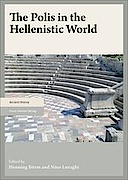New release: The Polis in the Hellenistic World. Edited by Henning Börm and Nino Luraghi
18. July 2018
Stuttgart: Franz Steiner Verlag 2018
Reference
After having been for decades the province of a relatively small group of scholars, the Hellenistic polis has become central to the research agenda of Ancient historians more broadly. This development can be traced from the early nineties of the last century, and has picked up pace in a sustained fashion at the turn of the millennium. Recent research has started approaching the Greek polis of the centuries between Alexander and Cleopatra as a specific historical phenomenon, striving to define its most peculiar aspects from as many angles as possible, and to point to new avenues of interpretation that might contribute to recognizing its historical role. In this general framework, this volume attempts to explore new lines of thought, to question established ways of reading the evidence, and to take stock of recent developments. The contributors do not subscribe to any particular shared approach; on the contrary, their approaches and questions stem from many different scholarly traditions and methodologies. Rather than seeking to achieve a complete coverage, the volume provides a selection of current research agendas, in many cases offering glimpses of ongoing projects. (publisher)
Dr. Henning Börm is a research assistant at the Chair of Ancient History at the University of Konstanz. 2014/15 he had a fellowship at the Institute of Advanced Study Konstanz.
Dr. Nino Luraghi is the David Magie Professor of Classics at Princeton University. 2013/14 he was a fellow of the Institute of Advanced Study Konstanz, researching the topic “The Culture of Freedom: A Cultural History of Early Hellenistic Athens”.
This book is based upon the conference "Rethinking the Polis in Hellenistic Times", organized 2014 by the editors and financed by the Center of Excellence "Cultural Foundations of Social Integration”. The Center has also funded the printing of this book.
